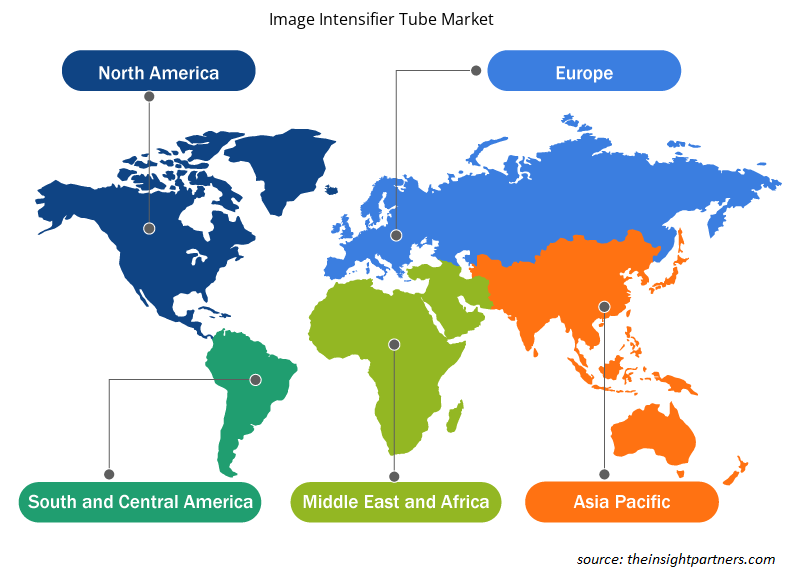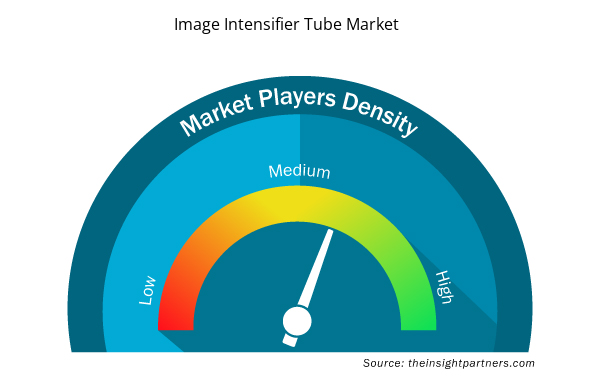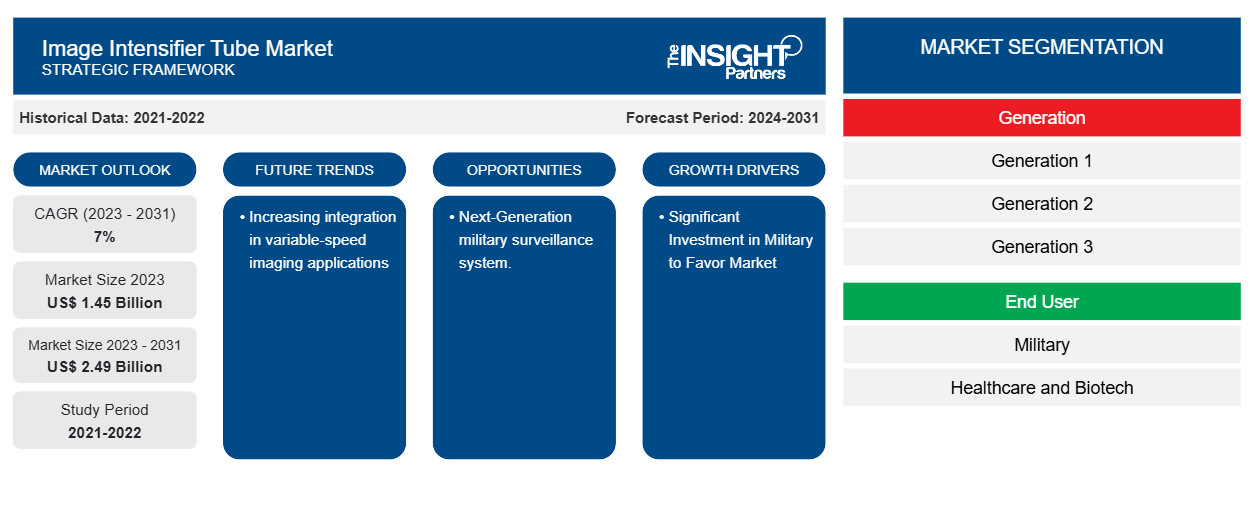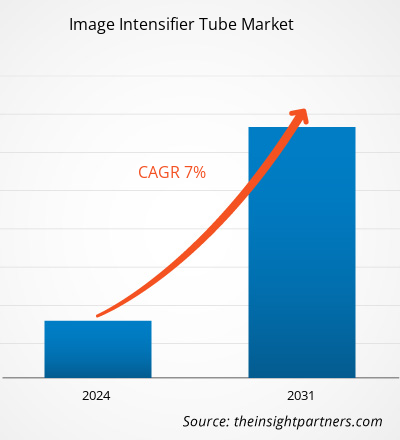图像增强管市场规模预计将从 2023 年的 14.5 亿美元增至 2031 年的 24.9 亿美元。预计 2023-2031 年期间,该市场的复合年增长率将达到7.0%。夜视系统采购和改进合同的增加以及对 X 射线机的需求不断增长可能仍是市场的主要趋势。
图像增强管市场分析
随着高速摄像机系统(包括HiCATT,一种适用于任何高速摄像机的增强器附件)采购量的不断增加,图像增强管市场的需求预计将增长。这些仪器用于在移动条件下捕捉图像。此外,夜视系统采购和改进合同的不断增加以及对 X 射线机的需求不断增长,正在推动图像增强管市场的增长。
图像增强管市场概况
图像增强管 ( IIT ) 是一种真空管,可将微光图像增强到可观察的水平。图像增强管是夜视设备中最重要的模块之一,在工业/国防/安全/应用中发挥着至关重要的作用。制造图像增强管的技术难度大,即使在同一工艺过程中,现代IIT的性能参数也会有所不同。此外,制造商提供的测试报告不能完全信任,因为不同制造商使用的测试方法存在差异。此外,文献资料提供了来自不同制造商的相互矛盾的声明。在世界市场上,经常可以找到两种数据表约束相同但图像质量不同的夜视设备。由于上述一些原因,测试图像增强管对于管制造商、夜视设备 ( NVD ) 制造商以及NVD的最终用户都非常重要。
定制此报告以满足您的需求
您可以免费定制任何报告,包括本报告的部分内容、国家级分析、Excel 数据包,以及为初创企业和大学提供优惠和折扣
- 获取此报告的关键市场趋势。这个免费样品将包括数据分析,从市场趋势到估计和预测。
图像增强管市场驱动因素和机遇
军事投资大幅增加利好市场
夜视已成为现代战争中一项非常重要的光电技术,越来越多的战斗在夜间出现和展开。Photonis图像增强管集成到世界领先的光学系统供应商的设备中。各种公司都提供用于军事用途的图像增强管。例如,Photonics是制造和设计用于军事和国防的先进图像增强管的先驱之一。Photonis为各种夜视设备提供高质量的图像增强管,使士兵在夜间行动中占据战略优势。
此外,公司正在采取多项举措。例如,公司正在采取各种举措,例如交付大量图像增强管。例如,2024 年 2 月,Exosens的品牌、图像增强管领域的全球领导者之一Photonis第二次被选中,为Theon Sensors 的Mikron夜视双筒望远镜供应 40,000 个 4G 16 毫米图像增强管,供应给德国和比利时武装部队。因此,对军事的大量投资正在推动图像增强管市场的发展。
下一代军事监视系统。
美国陆军正在征求对下一代机动无源雷达的需求,这是陆军远程持续监视系统的一种,安装在战术卡车上,可快速部署 60 英尺高的传感器,帮助区分巡航导弹、飞机和小型无人飞行系统。3 月 26 日,陆军负责开发和购买服务防空炮兵和野战炮兵传感器的办公室发布通知,征求可能有兴趣竞争新雷达的公司的反馈意见。此外,主要军队配备了第三代和第四代 NVD,它们提供卓越的图像质量、更大的范围和更少的光晕效应。第三代设备利用砷化镓光电阴极和微通道板 (MCP) 放大。因此,下一代军事监视系统在图像增强管市场拥有大量机会。
图像增强管市场报告细分分析
有助于得出图像增强管市场分析的关键部分是生成部分和最终用户。
- 根据代数,图像增强管市场分为第 1 代、第 2 代和第 3 代。第 2 代在 2023 年占据了相当大的市场份额。
- 根据最终用户,市场分为军事、医疗生物技术和其他。军事部门在 2023 年占据了相当大的市场份额。
图像增强管市场份额按地区分析
图像增强管市场报告的地理范围主要分为五个区域:北美、亚太、欧洲、中东和非洲、南美和中美。
北美一直主导着图像增强管市场。北美是采用先进技术最先进的地区之一。多年来,北美采用技术先进的军事装备以增强其军事能力的现象日益普遍。美国、加拿大和墨西哥等国家的政府机构都增加了军费开支。此外,北美各国在医疗保健领域的投资也有所增加,以增强其医疗基础设施。因此,增加对图像增强管必不可少的领域的投资正在推动市场增长。
图像增强管市场区域洞察
Insight Partners 的分析师已详尽解释了预测期内影响图像增强管市场的区域趋势和因素。本节还讨论了北美、欧洲、亚太地区、中东和非洲以及南美和中美洲的图像增强管市场细分和地理位置。

- 获取图像增强管市场的区域特定数据
图像增强管市场报告范围
| 报告属性 | 细节 |
|---|---|
| 2023 年的市场规模 | 14.5亿美元 |
| 2031 年市场规模 | 24.9亿美元 |
| 全球复合年增长率(2023 - 2031) | 7% |
| 史料 | 2021-2022 |
| 预测期 | 2024-2031 |
| 涵盖的领域 | 按代数
|
| 覆盖地区和国家 | 北美
|
| 市场领导者和主要公司简介 |
|
市场参与者密度:了解其对商业动态的影响
图像增强管市场正在快速增长,这得益于终端用户需求的不断增长,而这些需求又源于消费者偏好的不断变化、技术进步以及对产品优势的认识不断提高等因素。随着需求的增加,企业正在扩大其产品范围,进行创新以满足消费者的需求,并利用新兴趋势,从而进一步推动市场增长。
市场参与者密度是指在特定市场或行业内运营的企业或公司的分布情况。它表明在给定市场空间中,相对于其规模或总市场价值,有多少竞争对手(市场参与者)存在。
在图像增强管市场运营的主要公司有:
- 贝尔光电设备有限公司(BELOP)
- HARDER.digital
- 佳能电子管器件有限公司
- L3Harris 技术公司
- 新康光学
- 光泰克
免责声明:上面列出的公司没有按照任何特定顺序排列。

- 获取图像增强管市场顶级关键参与者概览
图像增强管市场新闻和最新发展
图像增强管市场通过收集一手和二手研究后的定性和定量数据进行评估,其中包括重要的公司出版物、协会数据和数据库。下面列出了图像增强管市场的一些发展情况:
- Exosens 宣布推出 25 毫米图像增强器解决方案,扩大其 Photonis Ultimate Detection 科学成像产品组合。这项最新技术旨在支持各种科学应用,如医疗和高速成像、机器视觉、机器人技术和研究,将在 SPIE Photonics West 上展出。
(来源:Exosens,公司网站,2024 年 1 月)
- Photonis 是 Exosens 旗下品牌,也是图像增强管领域的全球领导者之一,该公司第二次被选中,为 Theon Sensors 的 Mikron 夜视双筒望远镜供应 40,000 个 4G 16 毫米图像增强管,并将供应给德国和比利时武装部队。
(来源:Photonis 公司名称,2024 年 2 月)
图像增强管市场报告覆盖范围和交付成果
“图像增强管市场规模和预测(2021-2031)”报告对以下领域进行了详细的市场分析:
- 范围内涵盖的所有主要细分市场的图像增强管市场规模及全球、区域和国家层面的预测。
- 图像增强管市场趋势以及市场动态,如驱动因素、限制因素和关键机遇。
- 详细的 PEST/波特五力分析和 SWOT 分析。
- 图像增强管市场分析涵盖主要市场趋势、全球和区域框架、主要参与者、法规和最新的市场发展。
- 行业格局和竞争分析,涵盖市场集中度、热图分析、知名参与者以及图像增强管市场的最新发展。
- 详细的公司简介。
- 历史分析(2 年)、基准年、预测(7 年)及复合年增长率
- PEST 和 SWOT 分析
- 市场规模价值/数量 - 全球、区域、国家
- 行业和竞争格局
- Excel 数据集



Report Coverage
Revenue forecast, Company Analysis, Industry landscape, Growth factors, and Trends

Segment Covered
This text is related
to segments covered.

Regional Scope
North America, Europe, Asia Pacific, Middle East & Africa, South & Central America

Country Scope
This text is related
to country scope.
常见问题
North America is anticipated to dominate the image intensifier tube market in 2023.
Increasing contracts for procurement and advancement of night vision systems and rising demand for X-ray machines are some of the factors driving the image intensifier tube market.
Increasing integration in variable-speed imaging applications is anticipated to drive the image intensifier tube market in the forecast period.
The key players holding majority shares in the global image intensifier tube market are BEL Optronic Devices Limited (BELOP)., HARDER.digital, Canon Electron Tubes & Devices Co., Ltd, L3Harris Technologies, Inc., Newcon Optik, Photek, Exosens, Hamamatsu Photonics K.K., ELBIT SYSTEMS OF AMERICA, LLC., Siemens Healthcare Limited.
The global image intensifier tube market is expected to reach US$ 2.49 billion by 2031.
The expected CAGR of the market is 7.0%.
Trends and growth analysis reports related to Electronics and Semiconductor : READ MORE..
The Insight Partners performs research in 4 major stages: Data Collection & Secondary Research, Primary Research, Data Analysis and Data Triangulation & Final Review.
- Data Collection and Secondary Research:
As a market research and consulting firm operating from a decade, we have published and advised several client across the globe. First step for any study will start with an assessment of currently available data and insights from existing reports. Further, historical and current market information is collected from Investor Presentations, Annual Reports, SEC Filings, etc., and other information related to company’s performance and market positioning are gathered from Paid Databases (Factiva, Hoovers, and Reuters) and various other publications available in public domain.
Several associations trade associates, technical forums, institutes, societies and organization are accessed to gain technical as well as market related insights through their publications such as research papers, blogs and press releases related to the studies are referred to get cues about the market. Further, white papers, journals, magazines, and other news articles published in last 3 years are scrutinized and analyzed to understand the current market trends.
- Primary Research:
The primarily interview analysis comprise of data obtained from industry participants interview and answers to survey questions gathered by in-house primary team.
For primary research, interviews are conducted with industry experts/CEOs/Marketing Managers/VPs/Subject Matter Experts from both demand and supply side to get a 360-degree view of the market. The primary team conducts several interviews based on the complexity of the markets to understand the various market trends and dynamics which makes research more credible and precise.
A typical research interview fulfils the following functions:
- Provides first-hand information on the market size, market trends, growth trends, competitive landscape, and outlook
- Validates and strengthens in-house secondary research findings
- Develops the analysis team’s expertise and market understanding
Primary research involves email interactions and telephone interviews for each market, category, segment, and sub-segment across geographies. The participants who typically take part in such a process include, but are not limited to:
- Industry participants: VPs, business development managers, market intelligence managers and national sales managers
- Outside experts: Valuation experts, research analysts and key opinion leaders specializing in the electronics and semiconductor industry.
Below is the breakup of our primary respondents by company, designation, and region:

Once we receive the confirmation from primary research sources or primary respondents, we finalize the base year market estimation and forecast the data as per the macroeconomic and microeconomic factors assessed during data collection.
- Data Analysis:
Once data is validated through both secondary as well as primary respondents, we finalize the market estimations by hypothesis formulation and factor analysis at regional and country level.
- Macro-Economic Factor Analysis:
We analyse macroeconomic indicators such the gross domestic product (GDP), increase in the demand for goods and services across industries, technological advancement, regional economic growth, governmental policies, the influence of COVID-19, PEST analysis, and other aspects. This analysis aids in setting benchmarks for various nations/regions and approximating market splits. Additionally, the general trend of the aforementioned components aid in determining the market's development possibilities.
- Country Level Data:
Various factors that are especially aligned to the country are taken into account to determine the market size for a certain area and country, including the presence of vendors, such as headquarters and offices, the country's GDP, demand patterns, and industry growth. To comprehend the market dynamics for the nation, a number of growth variables, inhibitors, application areas, and current market trends are researched. The aforementioned elements aid in determining the country's overall market's growth potential.
- Company Profile:
The “Table of Contents” is formulated by listing and analyzing more than 25 - 30 companies operating in the market ecosystem across geographies. However, we profile only 10 companies as a standard practice in our syndicate reports. These 10 companies comprise leading, emerging, and regional players. Nonetheless, our analysis is not restricted to the 10 listed companies, we also analyze other companies present in the market to develop a holistic view and understand the prevailing trends. The “Company Profiles” section in the report covers key facts, business description, products & services, financial information, SWOT analysis, and key developments. The financial information presented is extracted from the annual reports and official documents of the publicly listed companies. Upon collecting the information for the sections of respective companies, we verify them via various primary sources and then compile the data in respective company profiles. The company level information helps us in deriving the base number as well as in forecasting the market size.
- Developing Base Number:
Aggregation of sales statistics (2020-2022) and macro-economic factor, and other secondary and primary research insights are utilized to arrive at base number and related market shares for 2022. The data gaps are identified in this step and relevant market data is analyzed, collected from paid primary interviews or databases. On finalizing the base year market size, forecasts are developed on the basis of macro-economic, industry and market growth factors and company level analysis.
- Data Triangulation and Final Review:
The market findings and base year market size calculations are validated from supply as well as demand side. Demand side validations are based on macro-economic factor analysis and benchmarks for respective regions and countries. In case of supply side validations, revenues of major companies are estimated (in case not available) based on industry benchmark, approximate number of employees, product portfolio, and primary interviews revenues are gathered. Further revenue from target product/service segment is assessed to avoid overshooting of market statistics. In case of heavy deviations between supply and demand side values, all thes steps are repeated to achieve synchronization.
We follow an iterative model, wherein we share our research findings with Subject Matter Experts (SME’s) and Key Opinion Leaders (KOLs) until consensus view of the market is not formulated – this model negates any drastic deviation in the opinions of experts. Only validated and universally acceptable research findings are quoted in our reports.
We have important check points that we use to validate our research findings – which we call – data triangulation, where we validate the information, we generate from secondary sources with primary interviews and then we re-validate with our internal data bases and Subject matter experts. This comprehensive model enables us to deliver high quality, reliable data in shortest possible time.


 获取此报告的免费样本
获取此报告的免费样本